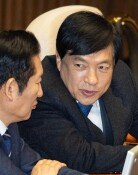Giddens: No 3rd Way to Resolve Climate Change
Giddens: No 3rd Way to Resolve Climate Change
Posted January. 22, 2010 09:29,
British sociologist Anthony Giddens, who sits in the House of Lords for the Labor Party, greeted a Dong-A Ilbo reporter at the entrance of the House of Lords at Westminster Tuesday, following a custom of Britains upper house.
The interior of the House of Commons is mostly green, but that of the House of Lords is mostly red. The upper house has no tea room or pub. It resembles a small village.
Giddens spoke to Dong-A on his book The Politics of Climate Change. The following is excerpts from the interview.
Dong-A: The Northern Hemisphere is extraordinarily cold this winter. Do you still believe in global warming? If scientific truth is different from what we see and feel, how can we accept that global warming is real?
Giddens: We should make a distinction between weather and climate. If weather means daily weather conditions, climate is the average weather conditions over a certain period of time. While weather refers to the climate of a certain region, climate is the climate of the entire planet. Britain has recently been cold, but neighboring Ireland has been much warmer than usual. Global warming is about climate, not weather.
Another characteristic about global warming is extreme weather patterns, going beyond simply being warm or cold. Australia has long suffered from drought and Britain from frequent floods. The earthquake that hit Haiti is not related to global warming, but the message is clear. The disaster has reminded us of the insurmountable power of nature. The impact of global warming will be enormous and nobody will be spared from the impact.
Dong-A: In your book The Politics of Climate Change published last year, you said climate change should not be an issue of left and right. Please explain.
Giddens: Policies to tackle climate change should get support from the vast majority of the people. This is because climate change policies are intended to create a new economy and society to prepare for future threats. Lets take as an example the U.S., the most important country in dealing with climate change. Id hoped that U.S. President Barack Obama would gain support from certain Republicans on climate change. What we saw, however, was political polarization between Democrats and Republicans. This affected global negotiations on climate change.
Though Obama participated in the U.N. climate summit in Copenhagen, he had nothing to present. Overcoming confrontation between left and right is not easy. We should, however, make a big political compromise whenever possible by all means. Climate change policies should be implemented consistently regardless of transfer of power. We should make climate change policies as a civil service so that a shift in power will not affect it.
Dong-A: What is the link between the environmental movement and climate change policies?
Giddens: The environmental movement has made a decisive contribution to placing climate change on the political agenda, but the movement itself has many shortcomings. The environmental movement began outside of parliament and developed mainly in Germany in the 1970s, emerging as a force against mainstream politics. Decentralization of power, zero-growth society and non-violence that environmentalists espouse contradict real politics. The slogan Lets return to nature is only meaningful for those who want to abide by it, but it has no bearing on the fight against global warming.
Environmentalists often say we should save the Earth. The politics of climate change we pursue is not related to saving the Earth. The Earth will survive regardless of our actions. The issue is the welfare of humans who live on the Earth.
Dong-A: Do you believe nuclear power will contribute to reducing greenhouse gas emissions?
Giddens: Nuclear power is an eco-friendly energy source that is reliable and competitive. Developing nuclear power, however, is very complex because it is related to nuclear proliferation and terrorism. To say my conclusion first, nuclear power generation is necessary to meet CO2 emission reduction targets as set by major economies.
Nevertheless, I oppose the idea of a large-scale expansion of nuclear power generation at a time when no progress has been made in international control over nuclear programs. Complete separation between nuclear power generation and nuclear weapons development is impossible. We should step up efforts to prevent North Korea and Iran from developing nuclear weapons through nuclear power generation. The Middle East is especially a risky area when it comes to nuclear proliferation.
Dong-A: What role should technological development play in cutting greenhouse gas emissions?
Giddens: Technological development is a critical factor in achieving a low carbon economy. We are at the beginning of a bigger industrial revolution toward a low carbon economy based on renewable energy technologies. Just as information technology has led the world economy over the past two decades, new eco-friendly technology will lead the world over the next two decades. Without renewable energy technologies, a transition to a low carbon economy is impossible.
China and India have difficulty finding new growth models. If such emerging economies attempt to follow the path the West has traveled, this will have a tremendously negative impact on the environment. Today, the leadership role of China and India is being gradually recognized. Technological innovation is critical for the two nations to find new growth models.
Dong-A: The Korean government last year presented the concept of green growth instead of sustainable growth. What do you think about it?
Giddens: I think green growth is the first step toward a low carbon economy and I prefer this concept. It is good for Korea to focus on sustainable investment. Such a transition can create jobs in large numbers. People have begun to see climate change policies as something that provides opportunities, not as something that costs more money. A country that makes more progress in this area will be more competitive in a globalized low carbon economy.
Dong-A: You have published a book every two years and sometimes one book per year. (When asked if he was age 72, Giddens said, Youre flat wrong, adding, I am 29.) How have you been able to work hard at your age?
Giddens: One of my favorite mottos is that of William Beveridge. He is one of founding fathers of the British welfare state and the author of The Beveridge Report. When he turned 80, he said, I am still radical, and young enough, to believe that mountains can be moved. This is my motto and I believe everybody should follow this.
pisong@donga.com







